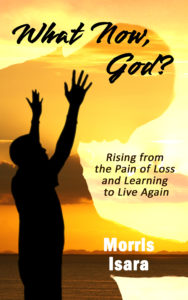 One morning, as I was getting ready to visit Jasmine, one of her doctors called and said, “Mr. Isara, the results of the MRI revealed that Jasmine has had several strokes resulting in damage to both sides of her brain.” After a brief discussion to clarify what that meant, the doctor said, “She will never regain consciousness.” This was a devastating blow, like a head-on collision at turn 38! Vision for the future shattered in a flash, like an airbag hitting me in the face! I could not fully process what I had just heard. My mind was reeling while my heart was breaking.
One morning, as I was getting ready to visit Jasmine, one of her doctors called and said, “Mr. Isara, the results of the MRI revealed that Jasmine has had several strokes resulting in damage to both sides of her brain.” After a brief discussion to clarify what that meant, the doctor said, “She will never regain consciousness.” This was a devastating blow, like a head-on collision at turn 38! Vision for the future shattered in a flash, like an airbag hitting me in the face! I could not fully process what I had just heard. My mind was reeling while my heart was breaking.
How could this be?
What about all our prayers?
Doesn’t God know that Jasmine can touch more people for Christ if she lives than if she dies?
And what about the special bond that she has with our five granddaughters? They are so young. If she does not make it, they will be deeply hurt and unable to understand why their grandma will never come home.
After overcoming the initial shock of hearing that her condition was terminal, I asked, “What now, God?” As the concussive blow subsided and I began to regain clarity, it became clear that we would need to pray for a miracle . . . literally a miracle! Natural healing became a medical impossibility.
COVID was still at its peak. ICU beds were in demand, and I felt her doctor nudging me to move Jasmine from the ICU to hospice care, and he graciously gave me some time to sort things out. End-of-life issues are emotionally complex and force us to make decisions we never want to deal with. Two days after learning her condition was terminal, I authorized her transfer from the ICU to the hospice unit. The atmosphere on the hospice floor was peaceful—no more whirling sounds of the ventilator or beeps from monitors. The only sound in Jasmine’s room was the cadence of her weak breaths as she now breathed on her own.
I did not want her to be alone, and I stayed at the hospital 24/7, except when my daughter, Rhapsody, visited, giving me brief periods to freshen up and care for our pets at home. A few days later, Rhapsody came to the hospital to spend the day with Jasmine, allowing me to go home to freshen up, take care of our pets, and catch up on a few things. I was home for only a few minutes when Rhapsody called and said, “Dad, you need to come back. Her time is very close.” I packed my lunch and headed back to Fort Worth, and after being on the road for only twelve minutes, she called to inform me that God had called Jasmine to her heavenly home.
God did not answer our prayers for Jasmine’s healing, and we now recognize God’s mercy. If she had improved to the point of being released from the hospital, she would have required 24-hour care, remained on oxygen for an extended period, undergone months of physical therapy, and been on dialysis for life or received a kidney transplant to regain a measure of normalcy. I was willing to be her caregiver and bear whatever physical, mental, emotional, or financial cost it would require. I concur with my children, who said, “Mom would not want to live that way.”
This is what surrendering Jasmine to God meant: experiencing His peace by trusting in His goodness and sovereignty to accomplish His will. Jasmine was my wife, but she belonged to Him as His child.
For if we live, we live to the Lord; and if we die, we die to the Lord. So then, whether we live or whether we die, we are the Lord’s. (Romans 14:8 ESV)
Her mission on earth is complete. She is now whole and fully alive, embraced by her Lord and Savior, Jesus Christ! After seventy years, despite the richness of family, friends, and her abiding faith in Christ, if God gave her a choice, she would have said as the Apostle Paul, “My desire is to depart and be with Christ, for that is far better.” (Philippians 1:23b ESV).
She is at peace . . . and so are we.
(Adapted from a chapter in the book by Morris Isara, What Now, God?, available on Amazon)
[/fusion_text][/fusion_builder_column][/fusion_builder_row][/fusion_builder_container]

Leave A Comment